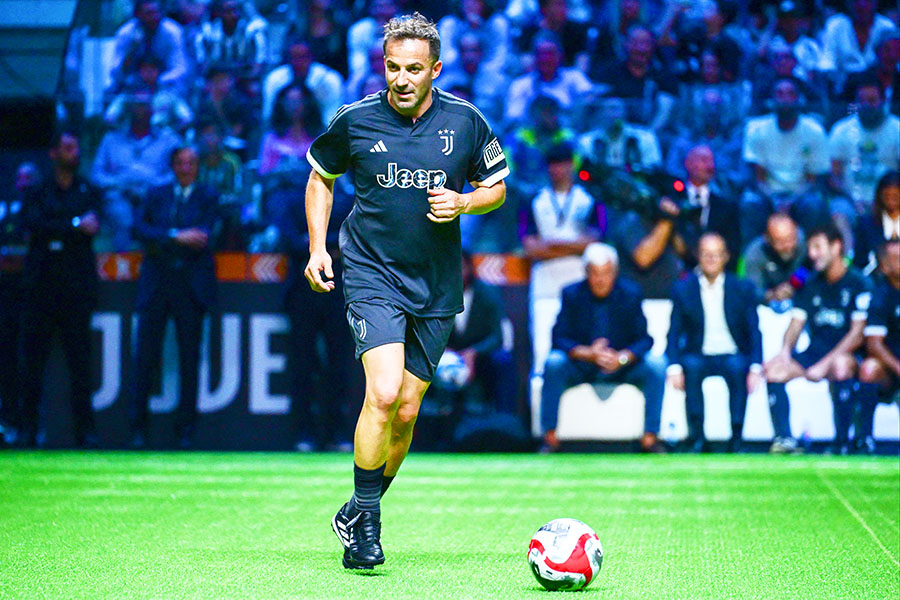
Never take your foot off the pedal: Alessandro del Piero
The football legend and the 2006 World Cup winner on what kept his hunger going for over two decades
 Juventus' former Italian player Alessandro Del Piero plays a football match during the "Together, a Black & White Show" event, the first Juventus party dedicated to all its fans, at the Pala Alpitour in Turin, on October 10, 2023. Image: MARCO BERTORELLO / AFP
Juventus' former Italian player Alessandro Del Piero plays a football match during the "Together, a Black & White Show" event, the first Juventus party dedicated to all its fans, at the Pala Alpitour in Turin, on October 10, 2023. Image: MARCO BERTORELLO / AFP
'Every loss helped me to move forward'
Growing up, I didn't have a role model to follow. We didn't have social media or the internet—the only way to know about other players was through the newspaper or watching their interviews on TV. Back then, my favourite and idol was Michel Platini, the French No. 10, who played for Juventus, the club I joined later and was part of for nearly two decades. When it came to my own game, I had my family's support, especially my dad, who was taking me everywhere. When I was about 13, I had to move to another city by myself, and my motivation came from following my passion and love for competition. I love challenges, and I hate to lose. Every time I would lose, I would take it as a big lesson and move forward. You learn from losses and how to turn them into better results subsequently. Losses are an introspective way to move forward.'Move to Juventus was a turning point'
How did football go from a recreational pursuit to a profession? It's a stage-by-stage progression, not a particular moment when you choose football. When you are young, you compete with your friends and then go over to the first team of your little town, and then, as you become one of the best in that team, you move on to another one. For me, the big jump came when I moved from Padova, the club I started playing for in 1991, to Juventus, with big expectations from everybody. That one was a big challenge because going straight from the youth to the most important team in Italy was quite a lot to handle. The team had a bunch of champion footballers like Roberto Baggio and Gianluca Vialli, and I always kept my eyes peeled out to see what they were doing. And not just them; I was also closely watching top-notch players from the opposition, like Ruud Gullit, Marco van Basten, and Franco Baresi. Every match was a moment of learning. Also read: LALIGA's India game plan: Using cricket to expand football horizon'My dad's death gave me a reality check'
I've had big losses in my career and had a huge injury on my left knee that took me out for a year. But the toughest period for me was the period when my dad was diagnosed with cancer, which also eventually led to his death. It was difficult because it was a scenario outside of your imagination. At that point, I was young and focused on football; I started to earn money and give back to my family. So everything was going well. And then something like this happened. It was a reality check for me about life outside football.'Surround yourself with people who keep you grounded'
I played international football by 20 and won a Champions Trophy by 21 or 22. And then my career took a bit of a dip following an injury. After that, I started what can be called a turnaround, a second innings, and I was part of the World Cup-winning squad in 2006. Of all the trophies I've won in my career, this is my most favourite. What kept me going over such a long period? My love for competition. I was dying to win. Of course, with the performances that followed came the pressure of expectations. But one can handle that with the kind of people you surround yourself with—your family, friends, and teammates, who keep you grounded and help you move on with life. Also read: How Arsene Wenger plans to make India a great football nation'Never stop working hard'
Even if you become the best in your profession, remember that someone or the other in some part of the world is working hard when you sleep to take the throne from you, which is why you never step off the pedal. You never let go of hard work. It's like being in the boxing ring. Your guard has to be up all the time. You should never consider yourself the best and never let your attention go down. The higher you go, the more painful the fall will be.'Indian Football needs to grow physically and tactically'
While football is an old sport in India, and the leagues have existed for many years, unlike in European countries like Italy, it hasn't been played at the highest level for so many years. Football isn't the main sport in India. That means there are physical and tactical differences. Talent-wise, it's a gap that can be bridged soon because talent is everywhere—all you need to do is discover it and teach them how to get better. It's a long journey if you want to become one of the top football-playing nations in the world. I haven't been that involved since my ISL stint in 2014, but from my experience from that time, I can say that they needed more facilities and more management to become better. We think of football about what happens on the field, but there are a lot of things to take care of before and after to grow as a team, and that's where the management comes in. Events like the RCB Innovation Lab x Leaders Meet: India are good for not just football but for Indian sports because icons from different sports get together to share ideas and experiences on what made them who they are. It brings up key questions and helps you solve them, so it's a good thing.Post Your Comment


















